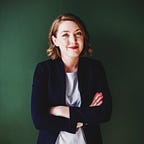A Pregnant Pause
It is hours before sunrise on a November Friday in Minnesota, and I, like countless others, am lying awake thinking about uncertainty, the pandemic, the U.S. election, and the future. As I write this, my world occupies an in-between space: what I’m sure in hindsight will be a fleeting moment but for now feels like a lifetime; a pause between the “before” and the unknown “after” that lies ahead.
Today happens to mark the start of the final trimester of my first pregnancy, the eleventh week of an anticipated two-year University of Cambridge Masters journey studying sustainability leadership, and the third morning since Election Day to awaken with no winner firmly declared.
Doomscrolling in the darkness before the dawn, I’m greeted by the following:
- At midnight just this Wednesday (Nov. 4, 2020), the U.S. became the only country to formally quit the Paris Agreement.
- On the heels of record wildfires, California announced Thursday (Nov. 5, 2020) that it will prohibit insurance companies from canceling or refusing to renew policies for 2.1 million households in or near impacted areas — likely continuing the cycle of rebuilding homes in burn zones without addressing the root cause that puts those communities at risk.
- And, today (Nov. 6, 2020), new research in Science Advances finds that Americans are using more plastic than ever, demonstrating that total U.S. contribution to coastal plastic pollution worldwide is five times larger than previously thought.
Throughout the two years of the program, Cambridge students are asked to create a blog to document and reflect on a ‘personal leadership opportunity’: a commitment to bring about actual positive change for sustainability. To that end, I’ve been writing (and rewriting) this first opening post with a general framing in mind: a discussion of the need for systemic, global change to address the climate crisis, the futility of relying on individual lifestyle changes as the sole solution, and a reflection on the role of personal leadership in marrying smaller-scale influence with broader action to create real impact. The draft doesn’t feel quite right yet... I continue to write, delete, scroll and refresh.
At this hour, I’m surrounded by a profound silence in which it seems everyone is waiting or listening for something; a pregnant pause.
According to Ladge et al’s 2012 study on life-altering events and the construction of identity, “ liminal periods” like this very moment are characterized by “feelings of ambiguity, openness, disorientation, self-questioning and indeterminacy” — a period where we may no longer feel connected to our former identity, and we are instead anticipating the formation of a new identity not yet solidified.
In their book “Holonomics”, authors Simon and Maria Robinson argue that the ‘point of liminality’ can represent a halfway point in transition, where existing structures have broken down but new ones have not yet been built.
Amid the many changes and uncertainties ahead, just as I embark upon creating this digital space and documenting my personal leadership journey and project, the political pendulum around me is in active motion. Where it lands will determine whether the U.S. executive branch acknowledges or denies the climate crisis in the year ahead. This, in turn, will inform the external context within which I’ll explore the role of the individual and the possibilities of personal leadership. For now, I join the world in drawing in my breath and waiting.
A poem by Wendell Berry, “The Peace of Wild Things” resonates today:
I’d love to ask, how do you approach periods of uncertainty?
Have you navigated other liminal spaces in your life? How do you think liminality can contribute to cultural change?
What role do you think personal leadership, or individual choices, can play in responding to systemic challenges?
